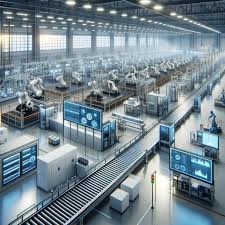Industrial Revolution: Transforming Economies and Societies
The Importance of Industrial Sector in Today’s Economy
In today’s global economy, the industrial sector plays a crucial role in driving economic growth and development. Industries encompass a wide range of activities, including manufacturing, construction, mining, energy production, and more. These sectors are vital for producing goods and services that meet the needs of society and contribute significantly to GDP.
One of the key benefits of a strong industrial sector is job creation. Industrial activities require a diverse range of skills and provide employment opportunities for millions of people worldwide. This not only helps reduce unemployment rates but also improves living standards and boosts consumer spending.
Furthermore, the industrial sector is essential for innovation and technological advancement. Industrial companies invest heavily in research and development to improve processes, create new products, and enhance efficiency. This leads to technological breakthroughs that drive progress across various industries and benefit society as a whole.
Moreover, the industrial sector plays a critical role in international trade. Many countries rely on their industrial exports to generate revenue and maintain trade balances. Strong industrial capabilities give nations a competitive edge in the global market and help them establish themselves as key players in the world economy.
However, it is essential for the industrial sector to embrace sustainability practices to mitigate environmental impact. Industrial activities can have significant environmental consequences if not managed responsibly. By adopting eco-friendly technologies, reducing waste generation, and promoting energy efficiency, industries can minimise their carbon footprint and contribute to a more sustainable future.
In conclusion, the industrial sector is a cornerstone of today’s economy, driving growth, innovation, job creation, and international trade. By prioritising sustainability and embracing technological advancements, industries can continue to thrive while contributing positively to society and the environment.
Top 5 Tips for Optimising Safety and Efficiency in Industrial Operations
- Ensure all industrial equipment is properly maintained to prevent breakdowns.
- Implement strict safety protocols to protect workers in industrial settings.
- Regularly train employees on the proper use of industrial machinery and equipment.
- Monitor and reduce energy consumption to increase efficiency in industrial operations.
- Stay updated on industry trends and advancements to remain competitive in the market.
Ensure all industrial equipment is properly maintained to prevent breakdowns.
To maintain optimal efficiency and prevent disruptions in industrial operations, it is crucial to ensure that all industrial equipment undergoes regular and thorough maintenance. By implementing a proactive maintenance schedule, businesses can identify and address potential issues before they escalate into costly breakdowns. Properly maintained equipment not only minimises downtime but also extends the lifespan of machinery, enhances safety standards, and ultimately contributes to the overall productivity and success of industrial operations.
Implement strict safety protocols to protect workers in industrial settings.
Implementing strict safety protocols is paramount to safeguarding the well-being of workers in industrial settings. By establishing clear guidelines, conducting regular safety training, and providing necessary protective equipment, companies can create a secure working environment that minimises the risk of accidents and injuries. Prioritising worker safety not only ensures compliance with regulations but also fosters a culture of care and responsibility within the organisation. When employees feel safe and supported, they are more productive, motivated, and engaged in their work, leading to a more efficient and successful industrial operation overall.
Regularly train employees on the proper use of industrial machinery and equipment.
Ensuring that employees receive regular training on the correct operation of industrial machinery and equipment is crucial for maintaining a safe and efficient work environment. Proper training not only helps prevent accidents and injuries but also enhances productivity and reduces downtime. By equipping employees with the necessary skills and knowledge to operate machinery safely, businesses can improve overall operational efficiency and create a culture of safety in the workplace. Regular training sessions also allow employees to stay updated on best practices and new technologies, ensuring that they can perform their tasks effectively while adhering to industry standards.
Monitor and reduce energy consumption to increase efficiency in industrial operations.
Monitoring and reducing energy consumption is a crucial tip for enhancing efficiency in industrial operations. By keeping a close eye on energy usage and implementing measures to reduce wastage, industrial facilities can not only lower operational costs but also minimise their environmental footprint. Energy-efficient practices, such as upgrading to energy-saving equipment, optimising production processes, and implementing smart energy management systems, can lead to significant improvements in productivity and sustainability. Embracing a culture of energy conservation not only benefits the bottom line but also contributes to a more sustainable future for the industrial sector.
Stay updated on industry trends and advancements to remain competitive in the market.
Staying updated on industry trends and advancements is crucial for businesses operating in the industrial sector to remain competitive in the market. By keeping abreast of the latest developments, companies can identify new opportunities, anticipate changes in consumer preferences, and adapt their strategies to stay ahead of the competition. Continuous learning and monitoring of industry trends enable businesses to innovate, improve efficiency, and deliver products and services that meet evolving market demands. Embracing new technologies and best practices can give industrial companies a competitive edge and position them for sustained success in a dynamic business environment.




